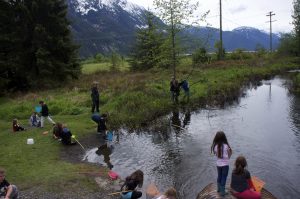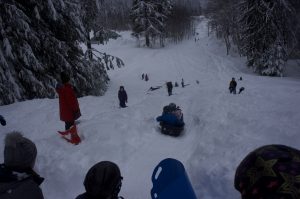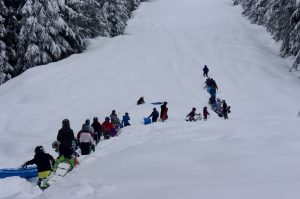I. General Information
School Name: Bear Valley School
School District: SD#82 Coast Mountains
Inquiry Team Members: Cari Hopkins: cari.hopkins@cmsd.bc.ca, Terri Scott: terri.scott@cmsd.bc.ca
Inquiry Team Contact Name/Email:Terri Scott/terri.scott@cmsd.bc.ca
II. Inquiry Project Information
Type of Inquiry: NOIIE
Grade Levels Addressed Through Inquiry: Primary (K-3), Intermediate (4-7)
Curricular Areas Addressed:
- Language Arts – Oral Language
- Language Arts – Writing
- Other: Outdoor Education
Focus Addressed:
- Community-based learning
- Core competencies (for example, critical thinking, communication, problem solving)
- Differentiated instruction
- Experiential learning
- Inquiry-based learning
- Land, Nature or Place-based learning
- Social and emotional learning
In one sentence, what was your focus for the year? We wanted to know if linking cross-grade, outdoor pursuits with written language instruction would improve students’ achievement in written expression.
III. Spirals of Inquiry Details
Scanning: We began our scan with a survey of student attitudes towards writing. We also asked if they could name two people in the school who support them. We collected writing samples in the fall of the year as our baseline data.
Focus: We had noticed that our learners had made slow progress in written expression since the closure of schools due to COVID in 2020. The intermittent absences due to waves of illness since that shut-down appeared to slowing down any momentum the students were making in writing. We felt that a new approach was needed to help students retain learning and build stronger skills that could withstand interruptions in learning.
Hunch: We have a rich natural environment at our doorstep, yet we were not using it in a focused and intentional way to enrich the learning of our students. We wondered if we used our assets, our access to the wilderness and our mixed grade classes, in creative ways would we see improvements in student learning. We wondered if encouraging interactions in mixed grade groups would increase vocabulary growth. We also wondered if we would see an improvement in writing outcomes if we combined focused instruction, outdoor pursuits and mixed grade groupings.
New Professional Learning: We looked at the theories of Lev Vygotsky, especially learning through play and social interactions. According to Vygotsky’s theories, play is essential to language development. Children also develop more quickly when interacting with others, especially older peers. We also researched outdoor education programs around the world and their findings. Children tended to learn more when exposed to natural environments and also demonstrated improved mental health.
Taking Action: The K/1/2 class and the Grade 6/7 classes worked on similar language concepts each week (prepositions, nouns, verbs, adverbs, adjectives, time/temporal clauses, descriptive language). Lessons were conducted in each classroom separately, at an appropriate level for each set of students. Students in both classes went on outings together, at least once per week, to play and practice using language concepts. Writing activities each week centred on using the language concepts while recalling play-based outdoor activities. Outings included walks in the woods, sledding, net fishing, creating art from natural materials, snowshoeing, and creating forts from found objects or from snow.



Photo description (above photos): Students from Bear Valley School playing together
in the natural environment of Stewart (photo credit: Terri Scott)
Checking: We used the Provincial Performance Standards for Written Expression to evaluate samples of our students’ writing. We took samples in October and in May. In October only 30% of the students in the K/1/2 class were fully meeting overall expectations in written expression. In the Grade 6/7 class, 33% of the students were fully meeting expectations. In May, 77% of the K/1/2 class was meeting or exceeding expectations in written expression, while the Grade 6/7 class had 58% of the students meeting or exceeding expectations.
Reflections/Advice: We were impressed by how quickly we began to see results from this inquiry. The students seemed to benefit greatly from our increased focus on social interactions and conversations with cross-grade peers. Practicing language concepts outdoors appeared to increase students’ retention of the concepts. Students in kindergarten were able to recognize prepositions even five months after the initial lesson! Overall, students were motivated to work on their writing skills and were excited to write about their experiences in the outdoors. We are interested in expanding this approach to include other subjects and secondary students.
